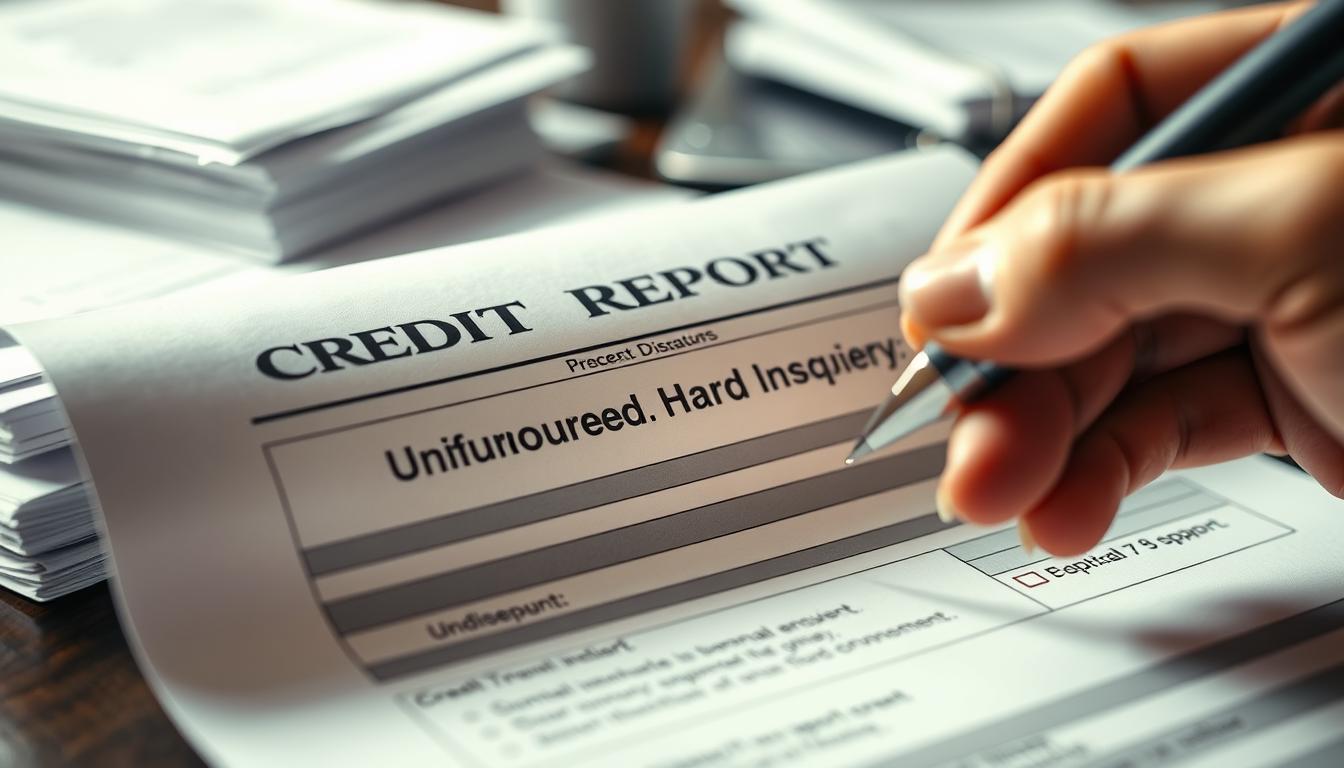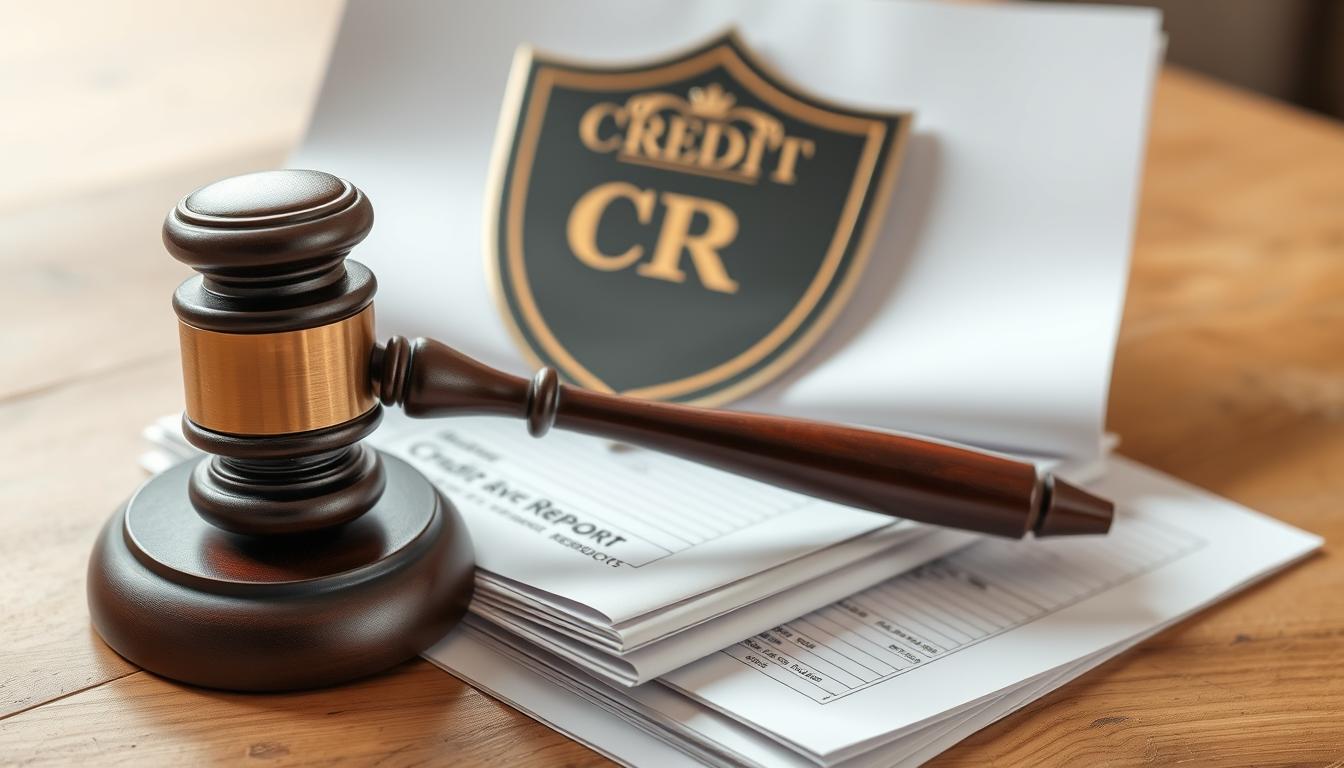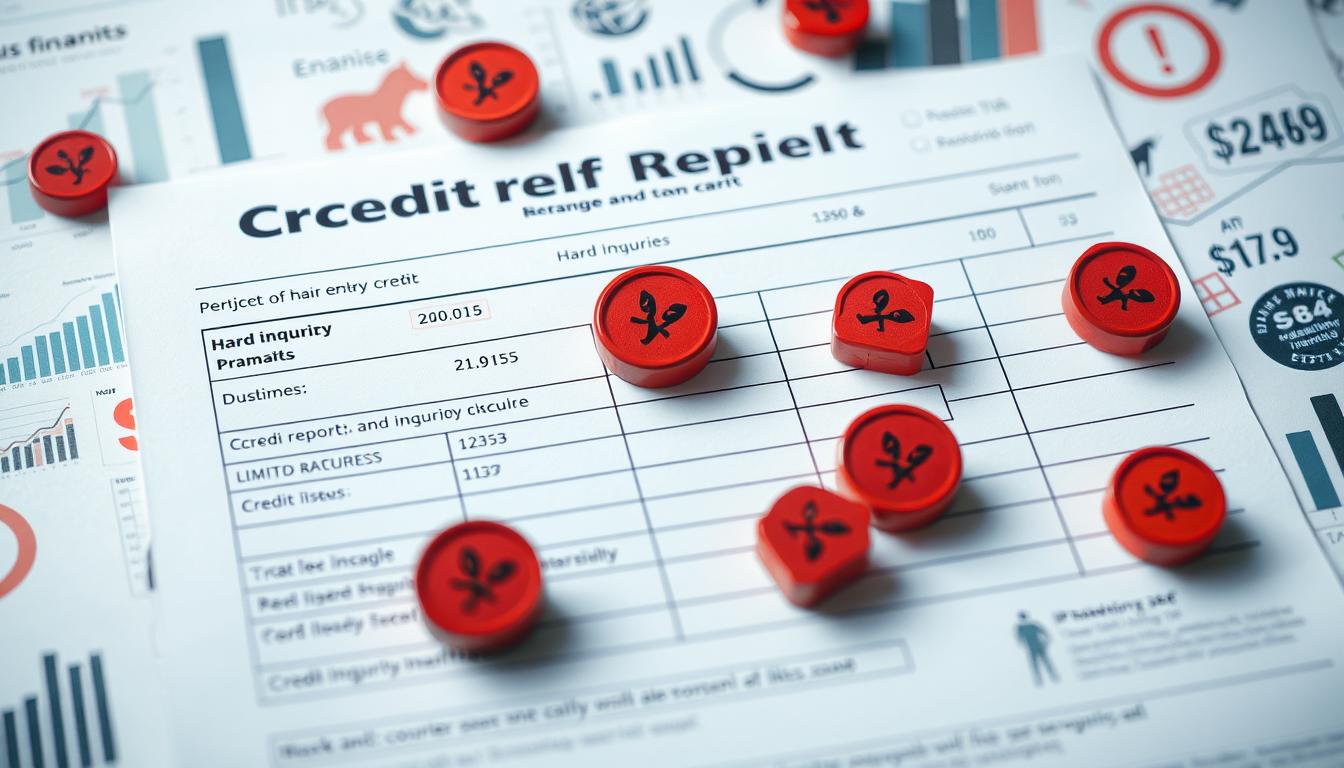A good credit score is vital for many aspects of life. It affects loans, apartment rentals, and even job prospects. Unexpected hard credit inquiries can harm your credit standing.
This guide covers unauthorized hard credit inquiries and their impact. We’ll explore how to spot these inquiries and dispute them effectively.
You’ll also learn proactive steps to protect your credit. These include credit monitoring and identity theft prevention.
Key Takeaways
- Understand the difference between authorized and unauthorized hard credit inquiries
- Learn how unauthorized hard inquiries can negatively affect your credit score
- Discover the signs of an unauthorized hard inquiry and how to identify them
- Explore the steps to dispute an unauthorized hard credit inquiry with credit bureaus
- Discover proactive measures to prevent unauthorized hard inquiries, such as credit monitoring and identity theft protection
What is an Unauthorized Hard Credit Inquiry?
Hard credit inquiries are important in credit reporting. They happen when lenders check your credit report during applications. These checks can affect your credit score.
It’s vital to know the difference between authorized and unauthorized inquiries. This knowledge helps protect your credit health.
Defining Hard Credit Inquiries
A hard credit inquiry is a deep review of your credit report. It occurs when you apply for new credit or loans. This “hard pull” can briefly lower your credit score.
Hard inquiries stay on your report for up to two years. Their impact on your score usually decreases over time.
Unauthorized vs. Authorized Inquiries
- Authorized inquiries are ones you start or approve. They happen when you apply for credit cards or loans. These are normal in credit applications.
- Unauthorized inquiries are checks you didn’t start or approve. They may signal identity theft or fraud. These can harm your credit score.
Knowing these inquiry types is key to safeguarding your credit. It helps you maintain a healthy credit report.
How Unauthorized Hard Inquiries Impact Your Credit Score
Unauthorized hard credit inquiries can significantly affect your credit score. They’re treated the same as authorized inquiries. Multiple hard inquiries in a short time can lower your credit score.
A hard credit check by a lender can temporarily decrease your score by a few points. This happens because hard inquiries suggest you might be taking on new debt.
Unauthorized inquiries are especially concerning. They indicate someone may have accessed your credit information without permission. This could be a sign of identity theft or fraud.
| Impact on Credit Score | Authorized Hard Inquiry | Unauthorized Hard Inquiry |
|---|---|---|
| Short-term Impact | Decrease of 5-10 points | Decrease of 5-10 points |
| Long-term Impact | Temporary, usually 12 months | Can last for up to 2 years if not addressed |
| Credit Application Approval | May be approved, depending on overall credit profile | May be denied or receive less favorable terms |
To protect your credit score, monitor your credit reports regularly. Dispute any suspicious activity you find. Taking these steps can help maintain a healthy credit score.
Signs of an Unauthorized Hard Credit Inquiry
Regularly check your credit reports to spot unauthorized hard credit inquiries. This helps identify potential identity theft or credit fraud. Stay proactive to protect your financial health and address suspicious activity quickly.
Reviewing Your Credit Reports Regularly
Check your credit reports from Experian, Equifax, and TransUnion yearly. This helps you catch any unfamiliar credit inquiries made without your consent. You can get free annual reports from AnnualCreditReport.com.
Identifying Unfamiliar Inquiries
- Carefully examine each hard credit inquiry listed on your credit report.
- Look for any unfamiliar inquiries that you don’t recognize or can’t associate with a specific credit application or activity.
- Be on the lookout for signs of identity theft, such as inquiries from companies or lenders you’ve never done business with.
- If you spot any questionable or unauthorized inquiries, take immediate action to investigate and dispute them with the credit bureaus.
Regular credit report reviews help spot unfamiliar credit inquiries. This allows you to take steps against potential identity theft or credit fraud. Stay alert to protect your financial well-being.
Steps to Dispute an Unauthorized Hard Credit Inquiry
Found an unauthorized hard inquiry on your credit report? You can dispute it. Here’s how to gather evidence and contact credit bureaus.
Gather Supporting Documentation
Collect documents that back up your unauthorized credit report dispute claim. These may include identity theft affidavits or police reports.
You’ll also need proof of identity, like a driver’s license copy. Gather any correspondence from the company that made the unauthorized credit bureau contact.
These supporting documentation will make your case stronger. They’ll help speed up the dispute process too.
Contact Credit Bureaus
Ready to start the dispute? Contact the credit bureaus directly. Here’s what to do:
- Submit a written dispute letter to each major credit bureau (Experian, Equifax, and TransUnion)
- Provide copies of your supporting documentation along with the dispute letter
- Request the credit bureaus to investigate the unauthorized inquiry and remove it from your credit report
Follow each bureau’s specific dispute procedures. Keep track of all correspondence and updates during the investigation.

Disputing unauthorized hard inquiries protects your credit score. It keeps your credit report accurate. Take action by gathering evidence and contacting credit bureaus.
Preventing Unauthorized Hard Credit Inquiries
Protecting your credit is vital. Credit monitoring services and identity theft protection are powerful tools to prevent unauthorized hard credit inquiries. These proactive measures can safeguard your financial health.
Credit Monitoring Services
Credit monitoring services offer a robust solution for credit protection. They constantly track your credit reports from major bureaus. You’ll get alerts about any changes or suspicious activity.
This quick detection helps you address unauthorized hard inquiries promptly. It ensures your credit score stays intact and gives you peace of mind.
Identity Theft Protection
Identity theft can lead to unauthorized credit inquiries. Protection services offer a multi-layered approach to safeguarding your personal information. They monitor the dark web for compromised data.
These services also provide credit and identity restoration assistance. They form a strong defense against identity-related fraud that could harm your credit report.
Using these tools helps you take charge of your credit health. You can significantly lower the risk of unwanted hard credit inquiries. This protection gives you the security you deserve.
“Protecting your credit is not just about managing your finances – it’s about safeguarding your identity and financial well-being.” – Financial Advisor, ABC News
Your Rights Under the Fair Credit Reporting Act
The Fair Credit Reporting Act (FCRA) protects consumers in credit reporting and disputes. It’s vital to know your rights under this law.
The FCRA lets you dispute errors on your credit report. Credit bureaus must investigate and fix any mistakes they find. This includes unauthorized hard credit inquiries that can harm your credit score.
You can get a free credit report yearly from each major bureau. This helps you spot any strange activity on your report.
The FCRA also limits hard inquiries on your credit report. This protects your credit report dispute rights. It stops businesses from checking your credit too often without asking.
Knowing your FCRA rights helps you watch your credit closely. You can dispute errors and protect your financial health.

“The Fair Credit Reporting Act is a critical piece of legislation that empowers consumers and holds credit bureaus accountable for the accuracy and fairness of credit reports.”
Unauthorized Hard Credit Inquiry and Credit Repair Services
Unauthorized hard credit inquiries can be frustrating. Credit repair services can help address these issues. They specialize in credit report disputes and can improve your credit score.
These services offer valuable assistance with unauthorized hard credit inquiries. They can review your credit report and identify unfamiliar inquiries.
Credit repair professionals help dispute unauthorized inquiries with credit bureaus. They ensure proper documentation is presented to support your claim.
- Identification of Unauthorized Inquiries: Credit repair professionals can thoroughly review your credit report to identify any unfamiliar or unauthorized hard inquiries that may be negatively impacting your credit score.
- Dispute Resolution: These services can assist you in the process of disputing the unauthorized inquiries with the credit bureaus, ensuring that the necessary documentation and evidence are presented to support your claim.
- Ongoing Monitoring: Many credit repair companies offer continuous monitoring of your credit reports, alerting you to any new unauthorized inquiries that may arise and helping you address them proactively.
Choose a reputable credit repair service with a proven track record. Look for positive customer reviews and transparent pricing. Avoid services making unrealistic promises or claiming to fix credit overnight.
“Addressing unauthorized hard credit inquiries can be a complex and time-consuming process, but credit repair services can be a valuable ally in your effort to maintain a healthy credit profile.”
Credit repair services can help you dispute unauthorized inquiries effectively. They protect your credit score and financial well-being. Your credit report reflects your financial history.
Taking action against inaccuracies can impact your long-term financial stability. Partner with a reliable service to regain control over your credit.
Impact of Multiple Hard Inquiries on Your Credit Score
A healthy credit score is vital. Understanding how multiple hard inquiries affect it is key. While one inquiry has little impact, many can significantly lower your score.
Hard inquiries happen when lenders check your credit report. They occur during loan or credit card applications. Each inquiry can drop your score by a few points.
Multiple hard inquiries can add up over time. They stay on your report for up to two years. More inquiries may hurt your score more.
Lenders might see many inquiries as a risk sign. They may think you’re desperately seeking credit. This could make them less likely to approve your applications.
- Limit applications for new credit: Avoid applying for multiple credit cards, loans, or other financial products within a short timeframe, as each application will result in a hard inquiry.
- Consolidate credit checks: If you’re rate shopping for a loan, such as a mortgage or auto loan, try to complete all your applications within a 14-45 day period, as most credit scoring models will only count these as a single inquiry.
- Monitor your credit report: Regularly review your credit report to ensure that any hard inquiries are legitimate and authorized. Dispute any unauthorized hard inquiries with the credit bureaus.
Managing multiple hard inquiries is crucial. By doing so, you can protect your credit score. This helps maintain a strong financial profile.

Credit Freezes: A Proactive Measure Against Unauthorized Inquiries
Protecting your credit from fraud is vital in our digital world. A credit freeze is a powerful tool to safeguard your finances. It restricts access to your credit report, making it harder for thieves to open accounts in your name.
Credit freezes block potential creditors from accessing your credit file. This prevents new accounts from being opened without your knowledge. It’s an effective way to stop unauthorized inquiries and protect against identity theft.
Benefits of a Credit Freeze
- Blocks unauthorized inquiries from appearing on your credit report
- Prevents identity thieves from opening new credit accounts in your name
- Allows you to maintain control over who can access your credit information
- Offers an additional layer of credit protection beyond credit monitoring services
Implementing a Credit Freeze
Placing a credit freeze is easy. Contact the three major credit bureaus: Experian, Equifax, and TransUnion. You can do this online, by phone, or by mail.
There may be a small fee for starting and removing a freeze. However, it’s worth it for the peace of mind and credit protection it provides.
| Credit Bureau | Contact Information |
|---|---|
| Experian | Phone: 1-888-397-3742 | Online: www.experian.com/freeze |
| Equifax | Phone: 1-800-349-9960 | Online: www.equifax.com/personal/credit-report-services/credit-freeze/ |
| TransUnion | Phone: 1-888-909-8872 | Online: www.transunion.com/credit-freeze |
By implementing a credit freeze, you can protect your credit from harm. This proactive step prevents unauthorized inquiries from damaging your financial health.
Common Causes of Unauthorized Hard Credit Inquiries
Unauthorized hard credit inquiries can hurt your credit score. Credit card fraud and credit bureau errors are the main causes. Understanding these issues helps protect your credit.
Credit Card Fraud
Identity thieves use stolen card info to open new accounts. This leads to unauthorized inquiries on your credit report. These actions can harm your credit history and score.
It’s vital to watch your credit reports closely. If you spot anything suspicious, take action right away.
Credit Bureau Errors
Sometimes, credit bureaus cause unauthorized hard inquiries. Wrong data entry, system issues, or clerical mistakes can add inquiries without your consent.
Check your credit reports often. This helps you find and fix these errors quickly.
Protect your credit by staying alert. Learn about common causes of unauthorized inquiries. This knowledge helps safeguard your finances and keep your credit healthy.

| Cause | Impact | Resolution |
|---|---|---|
| Credit Card Fraud | Severe damage to credit history and score | Monitor credit reports, take immediate action |
| Credit Bureau Errors | Inaccurate information on credit report | Regularly review credit reports, dispute errors |
Conclusion
Unauthorized hard credit inquiries can hurt your credit score and finances. Learn how to dispute these inquiries and protect your credit. Use credit monitoring services and know your rights under the Fair Credit Reporting Act.
Addressing unauthorized hard inquiries and filing credit report disputes are vital for financial security. Stay vigilant and use the right strategies to protect your credit history.
Your credit report and score are valuable assets. Stay informed and take action against unauthorized hard inquiries. This will help you build a stronger financial future.

